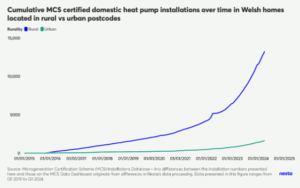Marine Furet, from Nesta, outlines how Welsh Government can act now to support households to take up heat pumps.
The Seventh Carbon budget – the Climate Change Committee’s set of recommendations to limit the UK’s greenhouse gas emissions – outlines a pathway where 60% of carbon emission reductions will need to come from switching fossil fuel heating, like gas boilers, to heating powered by electricity. As a clean, more efficient alternative to fossil fuel-based heating, heat pumps will be a crucial technology to bring about this change. However, unnecessary rules set Wales apart from the rest of the UK and may see households missing out on millions of pounds of support to upgrade their heating system.
The Welsh Government has embraced this direction of travel: the Heat Strategy for Wales includes a headline commitment to 580,000 heat pumps installed in Wales by 2035, an ambitious figure when the cumulative number of installation figures in Wales currently stands at around 15,000 units.
But while the UK Government’s Boiler Upgrade Scheme (BUS) currently offers £7,500 to homeowners shifting from a boiler to a low-carbon heating technology, in Wales, this process is slowed down by the UK’s most restrictive planning rules – but this may change soon.
However, unnecessary rules set Wales apart from the rest of the UK and may see households missing out on millions of pounds of support to upgrade their heating system.
Welsh Government has recently concluded a consultation on changes to the modifications householders can make to their homes without requiring planning permission (permitted development rights), which included heat pumps. Changes to permitted development rights are a perfect example of the way adapting regulations may prove a crucial tool in enabling decarbonisation and economic opportunities, futureproofing our homes and safeguarding our ecosystem.
A Welsh exception
Homeowners in Wales currently face the strictest planning rules in the UK when it comes to heat pumps. In Wales, to fall under permitted development rights, heat pumps must be located at least 3 metres from the property boundary. These restrictions are motivated by understandable concerns around sound pollution and aesthetics, but their adverse consequences outweigh their benefits and they are underpinned by outdated evidence. Wales’ planning rules on heat pumps set it apart from other nations: Scotland has no rule on distance from the property boundary, and England has recently abolished it.
These overly restrictive planning rules are slowing down progress. We know that installers often prioritise easier installations, as planning can add complexity and costs. The rules also make it more challenging for Welsh homeowners to take advantage of existing funding through BUS, by placing limits on where heat pumps can be installed that can discourage take up or make an installation more expensive. This grant covers a good proportion of the cost of an installation and, crucially, comes at no cost to the Welsh Government, at a time of stretched public finances, but it is currently only guaranteed until 2028. By delaying lifting the rules, the Welsh Government is giving those homeowners who are currently unable to install heat pumps due to planning permissions a shorter window to take advantage of the funding.
Syniadau uchelgeisiol, awdurdodol a mentrus.
Ymunwch â ni i gyfrannu at wneud Cymru gwell.
Wales already shows a relatively high level of uptake of heat pumps – the highest in the UK in 2024. Heat pump sales soared after the introduction of the BUS with a 147% increase in installations between 2022 and 2023, but this progress must continue for Wales to reach its ambitious installation targets. However, in densely built environments with limited outdoor space, the 3 metre requirement becomes increasingly difficult to meet without requiring full planning permission, which adds time, cost, and uncertainty to installations. This creates disproportionate barriers for urban properties with limited space, effectively restricting access to heat pump technology where housing density is highest. Planning restrictions severely affect the customer journey: research from Octopus showed a third of customers dropped out due to planning issues.

In addition to hampering uptake, the restrictions are informed by outdated evidence. The distance-based rule is not an effective protection against noise impacts, as shown by the Welsh Government’s own noise review. Indeed, it could make the problem worse by forcing homeowners to install their heat pumps in the middle of their garden to be further from a property’s boundary, when siting them against a boundary such as a hedge or fence can direct sound away and reduce noise by 1-3 dB.
Using sound as a guiding principle
Permitted development rights also specify a maximum volume of 1 cubic metre, and limit permitted development rights to a single heat pump per property. There also are restrictions on the location of the heat pump: permissions are required for siting a heat pump on a wall facing a road, in proximity of a wind turbine, and in a Conservation Area.
There is much the Welsh Government can do to avoid unintended consequences from home decarbonisation without hampering installations.
The Microgeneration Certificate Scheme, which sets standards for small-scale renewable energy generation or low-carbon heat, says that heat pumps shouldn’t make more than 37 decibels of noise at a neighbor’s property to be approved. Using this rule as a guide would allow installers to design the systems that work best for every home instead of being constrained by size or location.
There is much the Welsh Government can do to avoid unintended consequences from home decarbonisation without hampering installations. We understand there are concerns about the cumulative sound effects from heat pumps in more densely populated areas such as blocks of flats. However, our research has shown that having several heat pumps in a densely populated area produces relatively little noise, and focusing on compliance with MCS regulations will be a more effective protection for neighbouring households.
Futureproofing Welsh homes
Adding unnecessary planning barriers only leaves homeowners with increased installation costs due to applications, or risks them missing out on the BUS grant. Rules in conservation areas make this point clear.
Residents in conservation areas currently enjoy the benefits of modern infrastructure such as gas meters, rubbish bins and satellite dishes without needing to obtain planning permissions. Current rules restricting the installation of heat pumps in such areas unfairly prevents homeowners from accessing the benefits of decarbonisation. Historic England recently provided guidance on sympathetic heat pump installations in historic contexts and the Welsh Government should learn from this approach.
Moving at speed
The BUS grant is an important opportunity for homeowners to access funding to support them in the clean heat transition, but it is only guaranteed until 2028. We are encouraged by Welsh Government’s endorsement of heat pumps as a solution that could accelerate decarbonisation at scale, ensuring that future generations can enjoy cleaner air and comfortable homes. But the Welsh Government must remove unnecessary obstacles that slow down progress, discourage homeowners and installers, bar access to funding, and slow down the growth of the heat pump installer workforce that we will need for years to come.
Low-carbon heating represents a technological opportunity for Wales, and we must show future generations that we prioritised a pragmatic approach to reduce the damage caused by carbon emissions. However, this consultation is only one step on the way to change and was long overdue, coming out 18 months after Welsh Government’s commitment to review planning rules. To ensure progress, we must move at speed and Welsh Government should not shy away from deploying legislative tools such as Statutory Instruments to change law. In England, it took five months from consultation outputs being published to the law being changed. Could Welsh Government work at greater speed than its counterpart, and change legislation before 2026? Time will tell.





